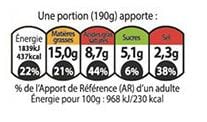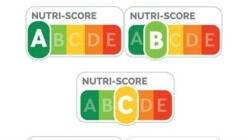Last month, as the French government officially adopted the Nutri-Score logo as the country's voluntary nutrition logo, Alliance 7 sent a letter to its members urging them to adopt the NutriColours logo, developed by Coca-Cola, Nestle, Mars, Mondelez, Pepsico and Unilever.
Alliance 7 is an industry association which brings together nine unions representing French manufacturers of chocolate, confectionery, baked snacks, cakes and biscuits, honey, coffee and ‘specialised nutrition’ products.
The NutriColour logo resembles the UK’s traffic light logo, giving a food or beverage several colours - green, amber or red - per nutrient, such as fat, salt and

sugar. It also gives nutrition information per serving size. The size of a ‘standard’ serving is defined by manufacturers.
Alliance 7 asked members to add the logo to 'non-material' platforms, such as websites, by 2018 and to come up with a time-frame for adding it to product packaging.
A spokesperson for the association said: "The Nutri-Colour system better informs the consumer by providing clear and precise information on the composition of products, including sugar or salt. The consumer can immediately identify how much of these nutrients are in the products, and the level of detail makes it possible to distinguish within the same category the differences in composition. It also tracks recipe changes and encourages manufacturers to continue their efforts in improving their products."
It said it wanted to see “relevant complementary nutritional labelling, uniform across Europe, entering into force at the same time in all EU countries.
“It is essential in the long term that a single system voluntary nutrition labelling be retained at European level for consumer information purposes,” it added.
‘A denial of scientific work’
Its position was swiftly criticised by Nutri-Score’s creator, Professor Serge Hercberg, director of research and professor of nutrition at the University of Medicine Paris 13.
“Alliance 7's position is totally scandalous at a time when the government has just made official the choice of Nutri-Score on the basis of numerous scientific studies which have demonstrated the superiority of Nutri-Score in relation to all other forms of logo,” he told FoodNavigator.

“This is a denial of scientific work and a desperate attempt to torpedo the Nutri-Score, which offers the best information that is simple, understandable, intuitive […] because it hinders Alliance 7 members who, as if by chance, represent industries that produce particularly sweet, fatty and salty foods.”
European rules on the single market mean that France cannot make the Nutri-Score logo mandatory.
However, the government has endorsed it as the country’ official voluntary logo, and it was signed into existence by decree last month (31 October) by the country’s health minister, Agnès Buzyn, the minister for agriculture and food Stéphane Travert and the secretary of state to the minister of economy and finance Benjamin Griveaux.
The government said the scheme was the “most effective device” to improve nutrition standards.
Several retailers such as Intermarché, Leclerc and Auchan as well as manufacturers Fleury Michon, McCain and Danone have pledged to use the Nutri-Score logo.
Before the logo was officially adopted, French food industry lobby ANIA opposed it. Last month, however, the association pledged to support companies adopting the scheme, although it added: “No single food can be considered good or bad for health.”
The Nutri-Score has also been backed by the World Health Organisation, which called it a straightforward logo that “clearly stood out as the most consumer-friendly scheme”.
